
– By Schwn Cyril Sabu
– Intern IPPCS’21
India and Japan share a deep historical-cultural relation due to Buddhism. Both nations fought the second world war on the rival position. However, efforts were initiated during the post-independence period to establish diplomatic relations resulting in the signing of a peace treaty in 1952. High-level diplomatic visits and meetings between the leaders of India and Japan have strengthened the relationship of the two Asian powers emerging as global partners. Japan has been the cornerstone of India’s ‘Look-East’ policy that recently became the ‘Act East Policy’.
The Modi-Abe bond after 2014 has helped India to emerge as a special strategic global partner of Japan. The quadrilateral cooperation between US, Australia, Japan and India on the Indo-Pacific has taken diplomacy towards a new direction of innovation. The bilateral cooperation on military, trade, development and technology needs to be analysed. It will help us to understand the importance of the Indo-Pacific strategy and how the cooperation can be utilised for countering Chinese expansionism in the global world.
Economically, Japan has played a significant role in the developmental journey of India. It has invested a total of $ 34 billion during the last two decades. Since the 1960s, Japan has been providing bilateral loans and grant assistance to India. In 2008, Japan signed an agreement with India to provide interest-free loans for railway projects between New Delhi and Mumbai. The 2015 agreement to build a bullet train line between Mumbai and Ahmedabad has been a landmark initiative in the economic partnership. Japan has also invested in infrastructural projects like Western Dedicated Freight Corridor (WDFC), Delhi-Mumbai and Chennai-Bengaluru industrial corridor along with twelve industrial townships. The island nation has partnered with India in the ‘Asia Africa Growth Corridor’ (AAGC) to develop an industrial corridor that will help in improving ties with Asian and African countries.
The ‘Comprehensive Economic Partnership Agreement (CEPA)’ signed between Japan and India eliminated export and import trade tariffs. The agreement resulted in the improvement of bilateral trade. The international trade between Japan and India increased from 13.1 billion in 2010 to 17.6 billion dollars in 2019. FDI (Foreign Direct Investment) flow from Japan to India has been concentrated on the automobile, telecommunication, chemical, financial, pharmaceutical and electrical equipment industry.
Beyond trade and commerce, both countries have been vocal about strategic and maritime independence opposing the dominance of China. Militarily, Coast Guards from both nations conducted regular annual exchanges from 2006. Convergence on strategic affairs has resulted in the joint military exercises between Japan and India. The regular participation of Japan in the Malabar Naval Exercise has improved maritime cooperation. The JIMEX (naval exercise), SHINYUU Maitri (air force exercise) and Dharma Guardian (military exercise) have built up the defence cooperation between India and Japan. The ‘Acquisition and Cross Servicing Agreement’ (ACSA) is a military cooperation pact signed between Japan and India. The accord allows armed forces from either side to coordinate closely on service and supplies. The policy allows access to the military base of each country. The recent listing of India in the defence report of Japan has been a remarkable achievement.
Technologically, during India’s nuclear test period, diplomatic relations between the two countries reached a low phase. Sanctions were imposed on India, which were lifted after 3 years. However, the ‘India-Japan Agreement for cooperation in the peaceful uses of nuclear energy’ 2016 resolved the differences through negotiations. Both countries have signed bilateral agreements on SC/ICT, start-ups, 5G and space research. These initiatives have broadened the technological horizons of Indo-Japanese relations.
The coming of the Abe administration was a significant point in the bilateral relationship. At the same time, India needs to make efforts to maintain the existing good friendship with Japan. Along with Japan, it needs to pursue and balance the security policy against China. High-level ministerial and bureaucratic meetings need to continue amidst the pandemic to expand the vision of the Indo-Pacific. The speculated expansion of the US Five Eyes intelligence-sharing alliance to include Japan and India will embolden the security relations and help to fight the Chinese aggression in the global order.
The Asia-Pacific Growth Corridor presents a big opportunity for India. The joint partnership has focussed on providing developmental assistance to Asian and African countries. The emerging Afro-Asian unity and cooperation can be used as a strategy to protect third-world countries from China’s debt-trap policy.
During the Modi-Abe era, Tokyo and New Delhi have cooperated on cybersecurity. India’s support for data localisation and reluctance to comply with global cybersecurity agreements remain a major challenge for technological cooperation.
The CEPA (Comprehensive Economic Partnership Agreement) has improved the international trade between India and Japan. It saw the rise in overseas trade from $13.1 billion in 2010 to $ 17.6 billion in 2019. However, India’s export has remained the same without much improvement. There has been more than a two-fold rise in the trade deficit for India. Hence, it becomes important to explore the untapped export potential of India. Through this effort, two of the countries will be able to equally benefit from trade.
India’s exit from the ‘Regional Comprehensive Economic Partnership’ in 2020 became a major disappointment for Japan. Without India, it becomes difficult for Japan to extend its sphere of influence in RCEP. This was followed by Mr. Abe calling off the visit to India.
Hence, India needs to re-evaluate and assess its engagement with the island nation. It needs to make an effort to continue and maintain the bilateral relationship. The upcoming elected government of Japan will be a crucial point for the future of Indo-Japanese relations. Continuing the strong Indo- Japanese relation will strengthen the Indo-Pacific and help to counter the wolf warrior diplomacy of China in geopolitics.
References
Banerjee , Sreeparna and Pratnashree Basu. “India-Japan Partnership in Third Countries: A Study of Bangladesh and Myanmar.” 2021. <https://www.orfonline.org/research/india-japan-partnership-in-third-countries-a-study-of-bangladesh-and-myanmar/>.
Bikhchandani, Raghav. “What is ‘Five Eyes’, the intelligence alliance US wants South Korea, India, Japan to be part of.” The Print 9 Semptember 2021. <https://theprint.in/world/what-is-five-eyes-the-intelligence-alliance-us-wants-south-korea-india-japan-to-be-part-of/730475/>.
CNBCTV18. “India-Japan partnership: Trade and beyond.” CNBCTV18 16 April 2021. <https://www.cnbctv18.com/views/india-japan-partnership-trade-and-beyond-8957701.htm>.
Dristi IAS. Dristi IAS. 28 April 2021. <https://www.drishtiias.com/daily-updates/daily-news-analysis/india-japan-7>.
Ministry of External Affairs. Brief Note on the India-Japan Bilateral Relations. Delhi: MEA, 2020. <https://www.mea.gov.in/Portal/ForeignRelation/India-Japan_Bilateral_Brief_feb_2020.pdf>.
—. MEA. 20 July 2017. <https://mea.gov.in/press-releases.htm?dtl/28678/The_entry_into_force_of_IndiaJapan_Agreement_for_Cooperation_in_the_Peaceful_Uses_of_Nuclear_Energy#:~:text=The%20Agreement%20was%20signed%20on,energy%20security%20and%20clean%20energy.>.
Pant , Harsh V and Shashank Mattoo. “The rising sun in India-Japan relations.” The Hindu 1 May 2021. <https://www.thehindu.com/opinion/op-ed/the-rising-sun-in-india-japan-relations/article34453087.ece>.
Pant, Harsh V. “Shinzo Abe’s formidable legacy and India-Japan ties.” Observer Research Foundation 3 September 2020. <https://www.orfonline.org/expert-speak/shinzo-abes-formidable-legacy-and-india-japan-ties/>.
Sansad TV. The Big Picture: India – Japan Cooperation. 4 July 2020. English. <https://www.youtube.com/watch?v=APwD3VAu5yE>.
Takenori, Horimoto. ““Modi Diplomacy” and the Future of Japan-India Relations.” Nippon 18 May 2020. <https://www.nippon.com/en/in-depth/a06701/>.

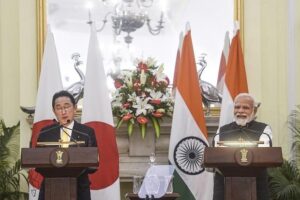


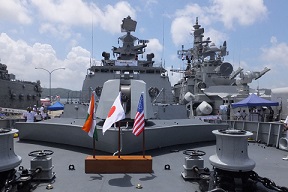
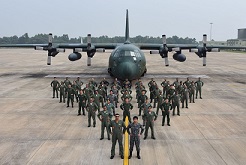



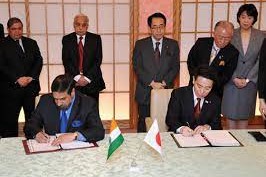

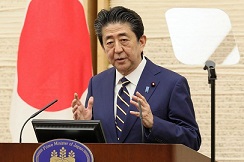
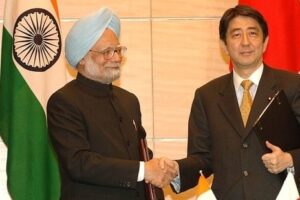

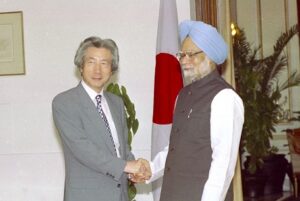
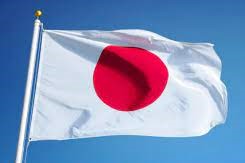
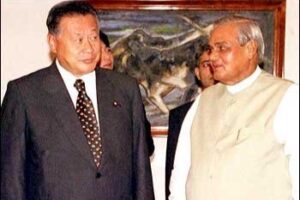
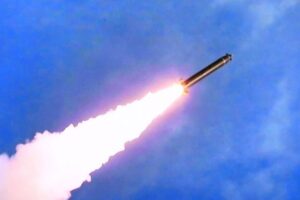
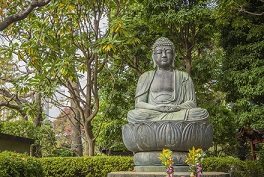


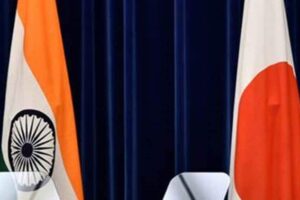
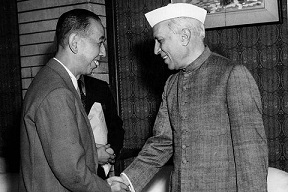


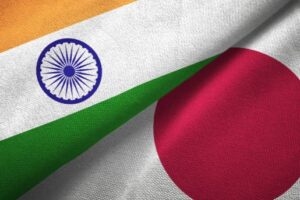
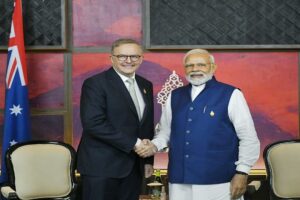


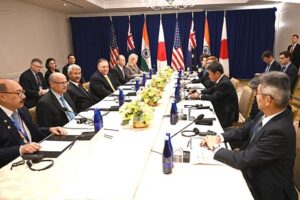
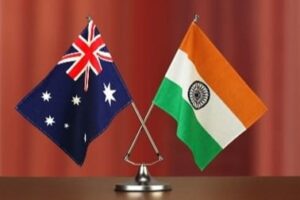
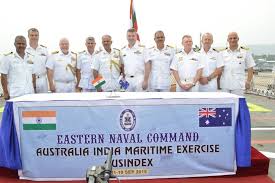

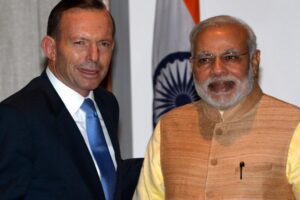

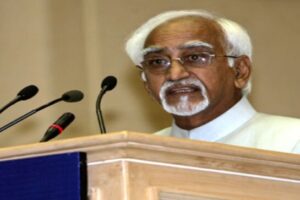



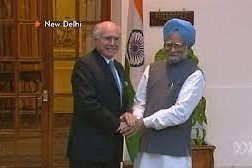
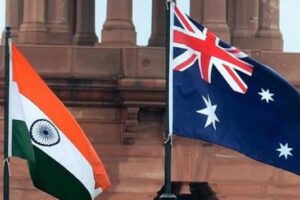


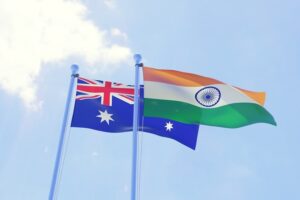

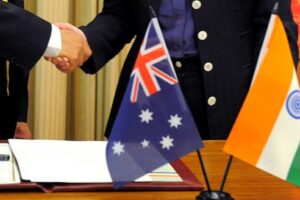
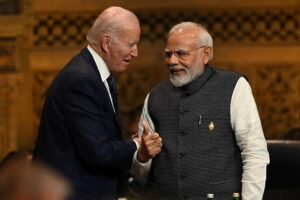
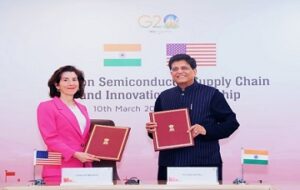
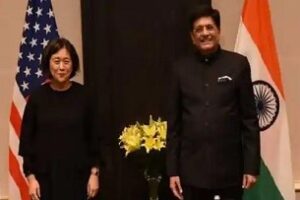
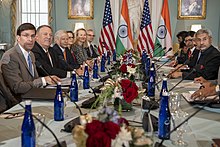

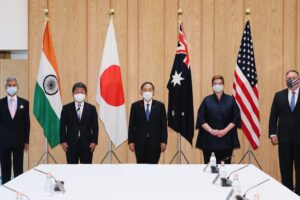
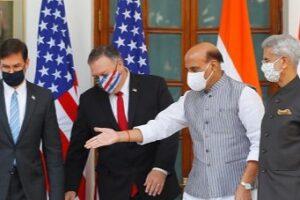
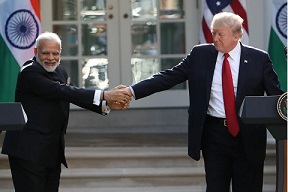
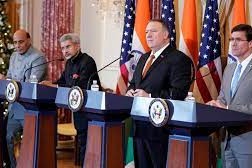

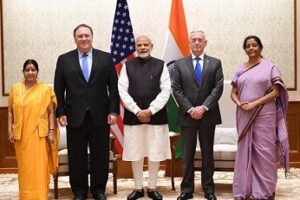
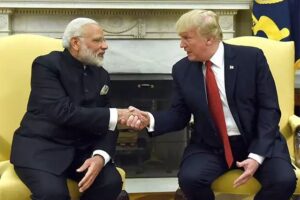
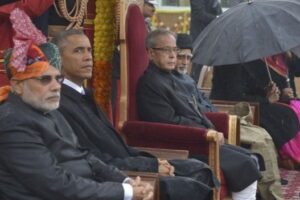
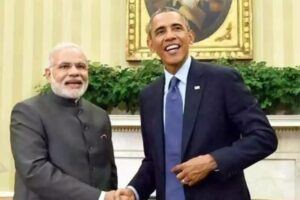
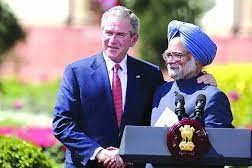
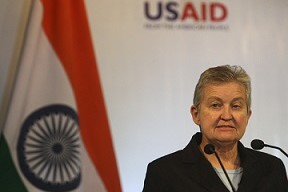
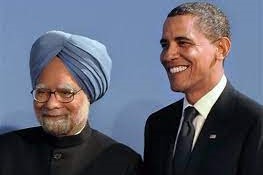
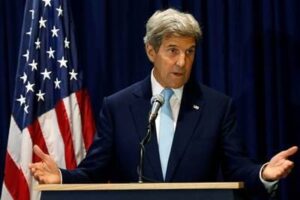
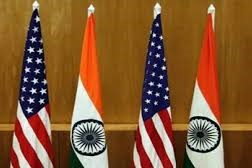
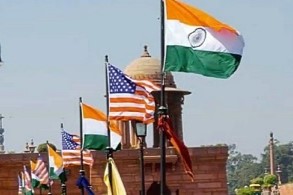
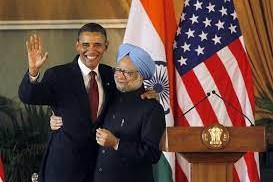
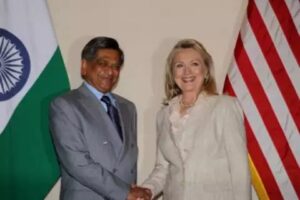

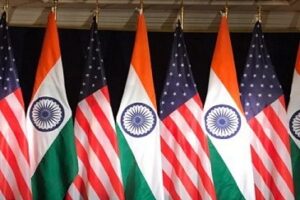
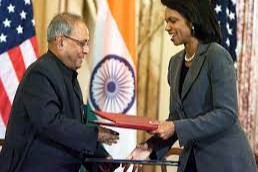

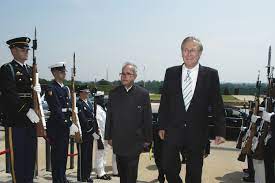




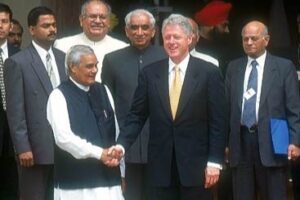
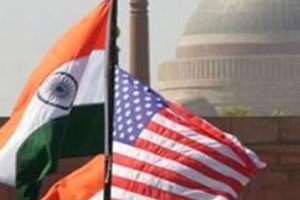

 onducted a total of five underground nuclear tests, breaking a 24-year self-imposed moratorium on nuclear testing. Pakistan followed, claiming 5 tests on May 28, 1998, and an additional test on May 30. The unannounced tests created a global storm of criticism, as well as a serious setback for decades of U.S. nuclear nonproliferation efforts in South Asia. On May 13, 1998, President Clinton imposed economic and military sanctions on India, mandated by Section 102 of the Arms Export Control Act (AECA), and applied the same sanctions to Pakistan on May 30. Some effects of the sanctions on India included: termination of $21 million in FY1998 economic development assistance; postponement of $1.7 billion in lending by the International Financial Institutions (IFI), as supported by the Group of Eight (G-8) leading industrial nations; prohibition on loans or credit from U.S. banks to the government of India; and termination of Foreign Military Sales under the Arms Export Control Act. Humanitarian assistance, food, or other agricultural commodities are excepted from sanctions under the law.
onducted a total of five underground nuclear tests, breaking a 24-year self-imposed moratorium on nuclear testing. Pakistan followed, claiming 5 tests on May 28, 1998, and an additional test on May 30. The unannounced tests created a global storm of criticism, as well as a serious setback for decades of U.S. nuclear nonproliferation efforts in South Asia. On May 13, 1998, President Clinton imposed economic and military sanctions on India, mandated by Section 102 of the Arms Export Control Act (AECA), and applied the same sanctions to Pakistan on May 30. Some effects of the sanctions on India included: termination of $21 million in FY1998 economic development assistance; postponement of $1.7 billion in lending by the International Financial Institutions (IFI), as supported by the Group of Eight (G-8) leading industrial nations; prohibition on loans or credit from U.S. banks to the government of India; and termination of Foreign Military Sales under the Arms Export Control Act. Humanitarian assistance, food, or other agricultural commodities are excepted from sanctions under the law. 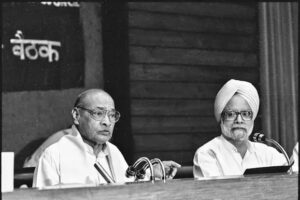
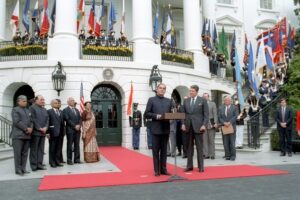



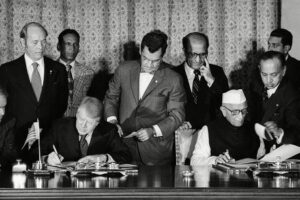
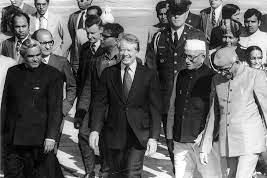

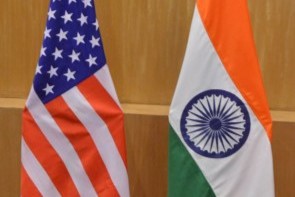

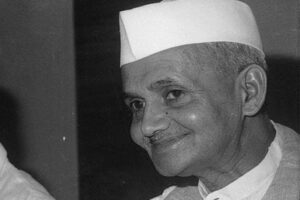

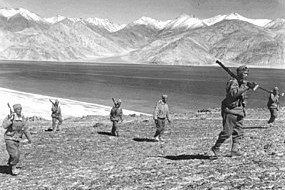

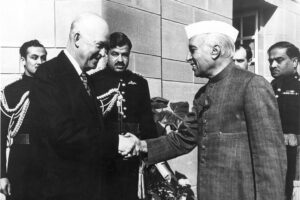

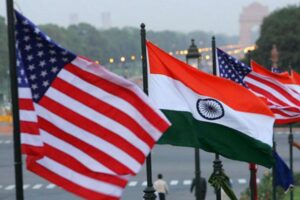
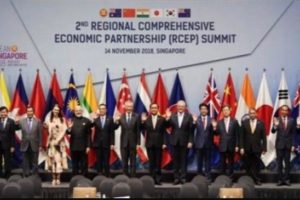 The first ministerial level meeting of QUAD was held on the sidelines of the United Nations General Assembly in New York. Before this, the QUAD had
The first ministerial level meeting of QUAD was held on the sidelines of the United Nations General Assembly in New York. Before this, the QUAD had AusIndEx is an exercise between India and Australia which was first held in 2015.The Australian
AusIndEx is an exercise between India and Australia which was first held in 2015.The Australian 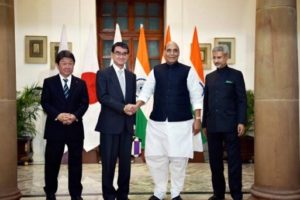

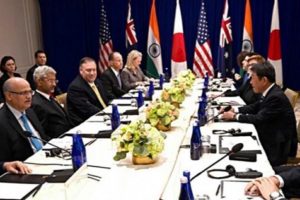

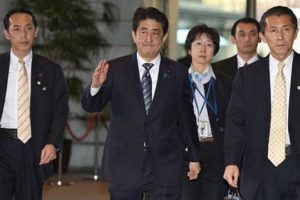



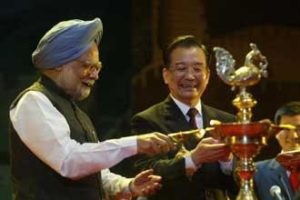 On recommendations of the Japanese government, the four countries met at Manila, Philippines for ASEAN Regional Forum (ARF) originally, but also ended up having a meeting of what we call the first meeting of four nation states on issues of
On recommendations of the Japanese government, the four countries met at Manila, Philippines for ASEAN Regional Forum (ARF) originally, but also ended up having a meeting of what we call the first meeting of four nation states on issues of 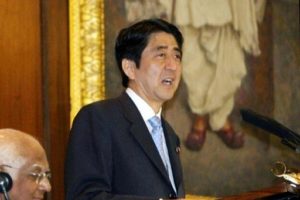 On his official visit to India, Japanese PM Mr. Shinzo Abe reinforced the ties of two nations, i.e., Japan and India with his famous speech about
On his official visit to India, Japanese PM Mr. Shinzo Abe reinforced the ties of two nations, i.e., Japan and India with his famous speech about  In 2007, Japanese President Shinzo Abe resigned from his post citing health reasons. This had a significant impact on QUAD as he was the architect & advocate of QUAD. His successor, Yasuo Fukuda, did not take up QUAD with such zeal leading to dormancy of the forum. (
In 2007, Japanese President Shinzo Abe resigned from his post citing health reasons. This had a significant impact on QUAD as he was the architect & advocate of QUAD. His successor, Yasuo Fukuda, did not take up QUAD with such zeal leading to dormancy of the forum. (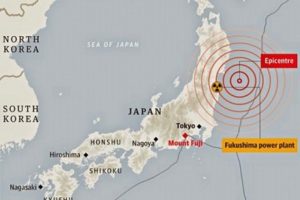 Japan earthquake and tsunami of 2011, also called Great Sendai Earthquake or Great Tōhoku Earthquake, was a 9.0 magnitude earthquake which struck below the floor of the Western Pacific at 2:49 PM. The powerful earthquake affected the northeastern coast of Honshu, Japan’s main island, and also initiated a series of large tsunami waves that devastated coastal areas of Japan, which also led to a major nuclear accident. Japan received aid from India, US, Australia as well as other countries. US Navy aircraft carrier was dispatched to the area and Australia sent search-and-rescue teams.
Japan earthquake and tsunami of 2011, also called Great Sendai Earthquake or Great Tōhoku Earthquake, was a 9.0 magnitude earthquake which struck below the floor of the Western Pacific at 2:49 PM. The powerful earthquake affected the northeastern coast of Honshu, Japan’s main island, and also initiated a series of large tsunami waves that devastated coastal areas of Japan, which also led to a major nuclear accident. Japan received aid from India, US, Australia as well as other countries. US Navy aircraft carrier was dispatched to the area and Australia sent search-and-rescue teams. 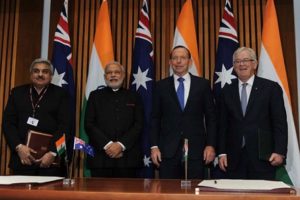 India and Australia signed the
India and Australia signed the 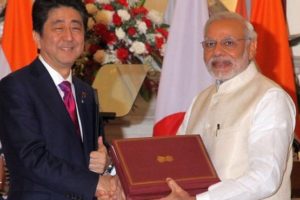 The India-Japan Agreement for Cooperation in the Peaceful Uses of Nuclear Energy was signed on 11 November, 2016 and came into force on 20 July, 2017 which was representative of strengthening ties between India and Japan. Diplomatic notes were exchanged between Dr. S. Jaishankar and H.E. Mr. Kenji Hiramatsu, Ambassador of Japan to India. (
The India-Japan Agreement for Cooperation in the Peaceful Uses of Nuclear Energy was signed on 11 November, 2016 and came into force on 20 July, 2017 which was representative of strengthening ties between India and Japan. Diplomatic notes were exchanged between Dr. S. Jaishankar and H.E. Mr. Kenji Hiramatsu, Ambassador of Japan to India. (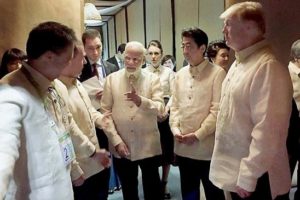 The foreign ministry
The foreign ministry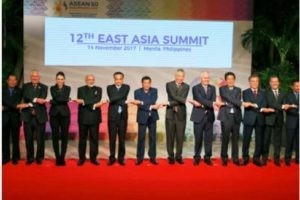 The Officials of QUAD member countries met in Singapore on November 15, 2018 for consultation on regional & global issues of common interest. The main discussion revolved around connectivity, sustainable development, counter-terrorism, maritime and cyber security, with the view to promote peace, stability and prosperity in the
The Officials of QUAD member countries met in Singapore on November 15, 2018 for consultation on regional & global issues of common interest. The main discussion revolved around connectivity, sustainable development, counter-terrorism, maritime and cyber security, with the view to promote peace, stability and prosperity in the  The 23rd edition of trilateral Malabar maritime exercise between India, US and Japan took place on 26 September- 04 October, 2019 off the coast of Japan.
The 23rd edition of trilateral Malabar maritime exercise between India, US and Japan took place on 26 September- 04 October, 2019 off the coast of Japan. 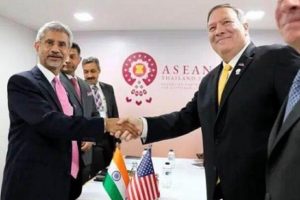 After the first ministerial level meeting of QUAD in September, 2019, the senior officials of US, Japan, India and Australia again met for consultations in Bangkok on the margins of the East Asia Summit. Statements were issued separately by the four countries. Indian Ministry of External Affairs said “In statements issued separately by the four countries, MEA said, “proceeding from the strategic guidance of their Ministers, who met in New York City on the sidelines of the UN General Assembly recently, the officials exchanged views on ongoing and additional practical cooperation in the areas of connectivity and infrastructure development, and security matters, including counterterrorism, cyber and maritime security, with a view to promoting peace, security, stability, prosperity in the Indo-Pacific region.”
After the first ministerial level meeting of QUAD in September, 2019, the senior officials of US, Japan, India and Australia again met for consultations in Bangkok on the margins of the East Asia Summit. Statements were issued separately by the four countries. Indian Ministry of External Affairs said “In statements issued separately by the four countries, MEA said, “proceeding from the strategic guidance of their Ministers, who met in New York City on the sidelines of the UN General Assembly recently, the officials exchanged views on ongoing and additional practical cooperation in the areas of connectivity and infrastructure development, and security matters, including counterterrorism, cyber and maritime security, with a view to promoting peace, security, stability, prosperity in the Indo-Pacific region.”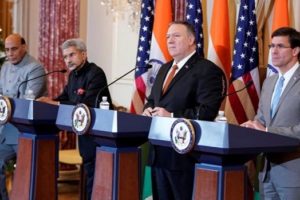 US 2+2 Ministerial Dialogue was held on 18 December, 2019, in Washington DC. Secretary of State Michael R. Pompeo and Secretary of Defense Mark T. Esper will host Indian Minister of External Affairs Dr. S. Jaishankar and Minister of Defense Shri Rajnath Singh. The discussion focussed on deepening bilateral strategic and defense cooperation, exchanging perspectives on global developments, and our shared leadership in the Indo-Pacific region.The two democracies signed the Industrial Security Annex before the 2+2 Dialogue. Assessments of the situation in Afghanistan, Pakistan, Nepal, Sri Lanka, and the Indian Ocean region in general were shared between both countries. (
US 2+2 Ministerial Dialogue was held on 18 December, 2019, in Washington DC. Secretary of State Michael R. Pompeo and Secretary of Defense Mark T. Esper will host Indian Minister of External Affairs Dr. S. Jaishankar and Minister of Defense Shri Rajnath Singh. The discussion focussed on deepening bilateral strategic and defense cooperation, exchanging perspectives on global developments, and our shared leadership in the Indo-Pacific region.The two democracies signed the Industrial Security Annex before the 2+2 Dialogue. Assessments of the situation in Afghanistan, Pakistan, Nepal, Sri Lanka, and the Indian Ocean region in general were shared between both countries. (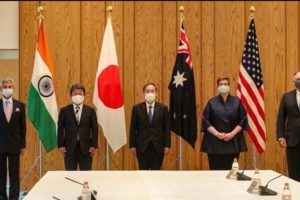 The foreign ministers of QUAD continued their discussions from the last ministerial level meeting in 2019, on 6 October, 2020. While there was no joint statement released, all countries issued individual readouts. As per the issue readout by India, the discussion called for a coordinated response to the challenges including financial problems emanating from the pandemic, best practices to combat Covid-19, increasing the resilience of supply chains, and enhancing access to affordable vaccines, medicines and medical equipment. There was also a focus on maintaining stability in the Indo-Pacific region amidst growing tensions. Australian media release mentions “We emphasised that, especially during a pandemic, it was vital that states work to ease tensions and avoid exacerbating long-standing disputes, work to counter disinformation, and refrain from malicious cyberspace activity. Ministers reiterated that states cannot assert maritime claims that are inconsistent with international law, particularly the United Nations Convention on the Law of the Sea (UNCLOS).”
The foreign ministers of QUAD continued their discussions from the last ministerial level meeting in 2019, on 6 October, 2020. While there was no joint statement released, all countries issued individual readouts. As per the issue readout by India, the discussion called for a coordinated response to the challenges including financial problems emanating from the pandemic, best practices to combat Covid-19, increasing the resilience of supply chains, and enhancing access to affordable vaccines, medicines and medical equipment. There was also a focus on maintaining stability in the Indo-Pacific region amidst growing tensions. Australian media release mentions “We emphasised that, especially during a pandemic, it was vital that states work to ease tensions and avoid exacerbating long-standing disputes, work to counter disinformation, and refrain from malicious cyberspace activity. Ministers reiterated that states cannot assert maritime claims that are inconsistent with international law, particularly the United Nations Convention on the Law of the Sea (UNCLOS).”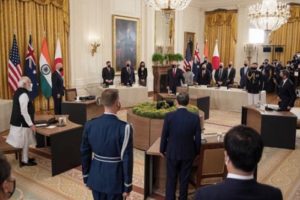 On September 24, President Biden hosted Prime Minister Scott Morrison of Australia, Prime Minister Narendra Modi of India, and Prime Minister Yoshihide Suga of Japan at the White House for the first-ever in-person Leaders’ Summit of the QUAD. The leaders released a Joint Statement which summarised their dialogue and future course of action. The regional security of the Indo-Pacific and strong confidence in the ASEAN remained on the focus along with response to the Pandemic.
On September 24, President Biden hosted Prime Minister Scott Morrison of Australia, Prime Minister Narendra Modi of India, and Prime Minister Yoshihide Suga of Japan at the White House for the first-ever in-person Leaders’ Summit of the QUAD. The leaders released a Joint Statement which summarised their dialogue and future course of action. The regional security of the Indo-Pacific and strong confidence in the ASEAN remained on the focus along with response to the Pandemic. 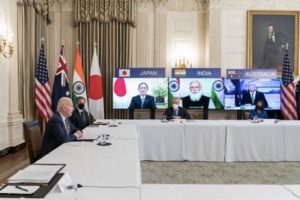 The QUAD Vaccine Partnership was announced at the first QUAD Summit on 12 March 2021 where QUAD countries agreed to deliver 1.2 billion vaccine doses globally. The aim was to expand and finance vaccine manufacturing and equipping the Indo-Pacific to build resilience against Covid-19. The launch of a senior-level QUAD Vaccine Experts Group, comprised of top scientists and officials from all QUAD member governments was also spearheaded.
The QUAD Vaccine Partnership was announced at the first QUAD Summit on 12 March 2021 where QUAD countries agreed to deliver 1.2 billion vaccine doses globally. The aim was to expand and finance vaccine manufacturing and equipping the Indo-Pacific to build resilience against Covid-19. The launch of a senior-level QUAD Vaccine Experts Group, comprised of top scientists and officials from all QUAD member governments was also spearheaded.  Although the Tsunami Core group had to be disbanded on fulfilment of its purpose, however the quadrilateral template that formed remained intact as a successful scaffolding of four countries, as stated by authors Patrick Gerard Buchan and Benjamin Rimland in their diplomatic brief about QUAD ( you can access the brief at
Although the Tsunami Core group had to be disbanded on fulfilment of its purpose, however the quadrilateral template that formed remained intact as a successful scaffolding of four countries, as stated by authors Patrick Gerard Buchan and Benjamin Rimland in their diplomatic brief about QUAD ( you can access the brief at  Secretary of State Colin Powell stated that the Core Tsunami Group was to be disbanded and folded and clubbed with the broader United Nations led Relief Operations. In a Tsunami Relief Conference in Jakarta, Secretary Powell stated that
Secretary of State Colin Powell stated that the Core Tsunami Group was to be disbanded and folded and clubbed with the broader United Nations led Relief Operations. In a Tsunami Relief Conference in Jakarta, Secretary Powell stated that 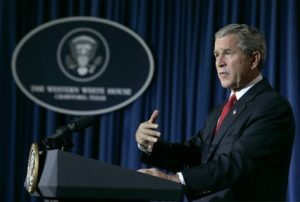 Soon after the Earthquake and Tsunami crisis, humanitarian reliefs by countries, viz., US, India, Japan, and Australia started to help the 13 havoc-stricken countries. The US initially promised $ 35 Millions in aid. However, on 29
Soon after the Earthquake and Tsunami crisis, humanitarian reliefs by countries, viz., US, India, Japan, and Australia started to help the 13 havoc-stricken countries. The US initially promised $ 35 Millions in aid. However, on 29 At 7:59AM local time, an earthquake of 9.1 magnitude (undersea) hit the coast of Sumatra, an Indonesian island. As a result of the same, massive waves of Tsunami triggered by the earthquake wreaked havoc for 7 hours across the Indian Ocean and to the coastal areas as far away as East Africa. The infamous Tsunami killed around 225,000 people, with people reporting the height of waves to be as high as 9 metres, i.e., 30 feet. Indonesia, Srilanka, India, Maldives, Thailand sustained horrendously massive damage, with the death toll exceeding 200,000 in Northern Sumatra’s Ache province alone. A great many people, i.e., around tens of thousands were found dead or missing in Srilanka and India, mostly from Andaman and Nicobar Islands of Indian territory. Maldives, being a low-lying country, also reported casualties in hundreds and more, with several non-Asian tourists reported dead or missing who were vacationing. Lack of food, water, medicines burgeoned the numbers of casualties, with the relief workers finding it difficult to reach the remotest areas where roads were destroyed or civil war raged. Long-term environmental damage ensued too, as both natural and man-made resources got demolished and diminished.
At 7:59AM local time, an earthquake of 9.1 magnitude (undersea) hit the coast of Sumatra, an Indonesian island. As a result of the same, massive waves of Tsunami triggered by the earthquake wreaked havoc for 7 hours across the Indian Ocean and to the coastal areas as far away as East Africa. The infamous Tsunami killed around 225,000 people, with people reporting the height of waves to be as high as 9 metres, i.e., 30 feet. Indonesia, Srilanka, India, Maldives, Thailand sustained horrendously massive damage, with the death toll exceeding 200,000 in Northern Sumatra’s Ache province alone. A great many people, i.e., around tens of thousands were found dead or missing in Srilanka and India, mostly from Andaman and Nicobar Islands of Indian territory. Maldives, being a low-lying country, also reported casualties in hundreds and more, with several non-Asian tourists reported dead or missing who were vacationing. Lack of food, water, medicines burgeoned the numbers of casualties, with the relief workers finding it difficult to reach the remotest areas where roads were destroyed or civil war raged. Long-term environmental damage ensued too, as both natural and man-made resources got demolished and diminished.
No responses yet